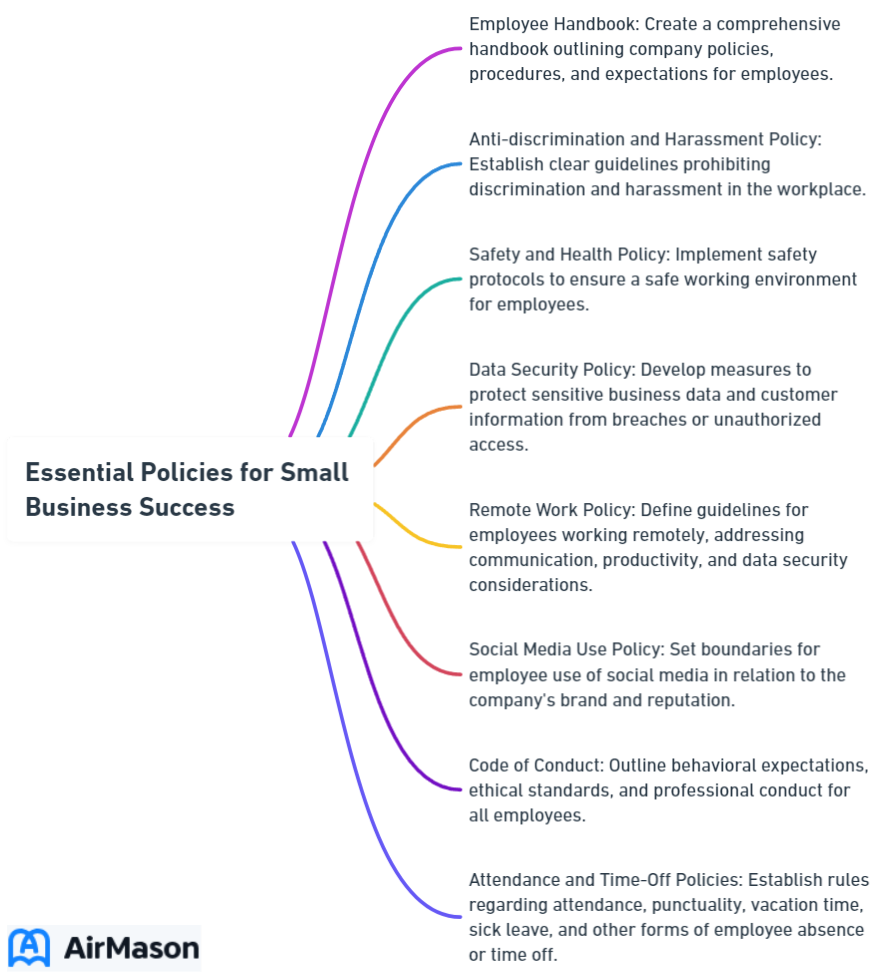
As a small business owner, you might wonder if having written policies for small business is truly necessary. The answer is a resounding yes! Well-defined policies play a crucial role in setting expectations, reducing misunderstandings, and protecting your business in case of disputes. In this blog post, we will explore the essential policies that can propel your small business towards success, covering everything from health and safety to purchasing and supplier relations. Are you ready to create a stronger foundation for your business? Let’s dive in!
Key Takeaways
- Creating and maintaining comprehensive company policies is essential for small business success.
- Policies should cover health & safety, quality assurance & customer service, code of conduct & ethics, employment & performance management, equal opportunity/diversity initiatives and internet/email use.
- Implementing these measures helps businesses grow while staying legally compliant.

The Importance of Policies in Small Businesses
Imagine a world without rules or guidelines. Chaos would ensue, and the same can be said for a small business without a clear written policy. Establishing written policies sets expectations for employee conduct and provides a framework to prevent misunderstandings. More importantly, these policies can protect your company in the event of any disputes.
Company policies can range from:
- Employee conduct
- Attendance
- Dress code
- Computer security measures like password changes and reporting phishing attempts, which are all part of the overall company policy.
According to the business policies definition, clear guidelines help employees understand the consequences of rule violations, thereby promoting responsible behavior.
As a small business owner, creating and maintaining comprehensive company policies is key, including substance abuse policies, diversity policies, and employee handbooks. This step not only fosters a harmonious work environment, but also ensures smooth and efficient business operations.
Health and Safety Policy
A comprehensive health and safety policy is not just a good idea—it’s a necessity. Implementing such a policy demonstrates a commitment to the safety of your staff, contractors, and visitors, as well as preventing workplace violence. But how can you ensure that your policy is up to par?
One crucial aspect to consider is adhering to regulations from the Occupational Safety and Health Administration (OSHA). Adherence to OSHA guidelines helps protect both employees and company property. Your health and safety policy should also include specifications for dealing with office crises, hazardous materials, and guidelines for appropriate employee behavior.
Furthermore, a well-crafted health and safety policy positions your business as an equal opportunity employer, committed to keeping all workers safe regardless of their background. This not only reflects positively on your business, but also helps you attract and retain top talent.

Quality Assurance and Customer Service Policy
In today’s competitive landscape, providing high-quality goods and services that meet customer expectations is more important than ever. A small business owner who delivers exceptional products and services can guarantee customer satisfaction and loyalty. But how can you ensure that your business maintains high standards?
One essential aspect is communication. Communicating new company policies to your employees is crucial for their awareness and adherence to these guidelines and can prevent potential conflicts in the future. A written Quality Policy illustrates your business’s commitment to delivering excellent services and products.
Don’t forget about customer service! Exceptional customer service is vital for small businesses, as it enables them to thrive and gain the trust of customers, who often return and contribute to increased sales. Implementing customer service policies to manage feedback and complaints helps maintain a strong connection with your clientele and fosters business growth.
Code of Conduct and Ethics Policy
A code of conduct and ethics policy is essential for any small business, as it ensures legal and ethical behavior while providing guidance on handling ethical situations and fostering positive relationships within the company. But what should such a policy entail?
A well-structured code of conduct policy should provide clear guidance on how employees should conduct themselves in relation to each other, customers, and potential business partners. Common regulations featured in a code of conduct policy include rules governing:
- Substance abuse
- Sexual harassment
- Gift-giving
- Dress code
- Confidentiality
- Use of cell phones or social media during work hours
Such policies ensure that staff abide by proper workplace behavior and ethics.
Implementing a robust code of conduct and ethics policy fosters a work environment where employees are clear about their responsibilities and the implications of their actions. This not only helps prevent potential legal issues, but also contributes to a positive company culture and reputation.
Employment and Performance Management Policy
Managing employees effectively is crucial to the success of your small business. Clear policies for:
- Performance reviews
- Compensation
- Non-discrimination
- Termination
To ensure fair treatment and foster a positive work environment, it is crucial to consider the needs and concerns of all employees, as well as job applicants.
An essential aspect of managing employees is having a disciplinary action policy. This policy should document expectations regarding performance and behavior and outline the disciplinary action to be taken when necessary, using the employee handbook as a reference. Providing a clear step-by-step process for disciplinary action ensures that each employee is treated equitably and understands the consequences of violating company policies.
Additionally, it’s crucial to have policies in place for various types of leave, such as:
- Sick leave
- Paid time off
- Maternity leave
- Parental leave
Covering all aspects of employee management in your policies fosters a supportive and productive work environment that benefits both your business and your employees.

Equal Opportunity and Diversity Policy
In today’s globalized world, fostering diversity and promoting equal opportunity are more important than ever. An equal opportunity and diversity policy can help ensure fair treatment in the workplace and discourage any inappropriate behavior based on:
- race
- gender
- sexual orientation
- religious and cultural beliefs
Implementing an equal opportunity policy fosters a more inclusive workplace, where all employees have equal access to opportunities, regardless of their background. This policy should encompass various aspects of your business, including:
- Recruitment
- Hiring
- Promotion
- Training
- Workplace accommodations
Embracing diversity and promoting equal opportunity enriches your small business with a more inclusive and productive work environment. Not only will this policy help attract and retain top talent, but it will also contribute to a positive company culture that values and respects all employees, regardless of their background.
Internet, Email, and Social Media Policy
As the digital age continues to evolve, it’s essential for small businesses to establish a company IT policy for employee internet, email, and social media usage at work. Responsible use of these platforms is vital not only for productivity, but also for protecting company information.
For responsible use, clear instructions on expected conduct and permissible usage should be provided in your internet, email, and social media policy. This includes establishing ground rules on appropriate content sharing, personal use of company resources, and data security.
Implementing a robust internet, email, and social media policy safeguards your business from potential legal issues, data breaches, and wasted resources. Furthermore, you can maintain a professional work environment that fosters productivity and responsible behavior.
Environmental and Corporate Social Responsibility Policy
Environmental policies and corporate social responsibility (CSR) initiatives are becoming increasingly important in the business world. Implementing such policies showcases your small business’s commitment to sustainability and distinguishes it from competitors.
CSR initiatives can encompass a wide range of activities, including:
- Sponsoring community events
- Adopting eco-friendly practices in your daily operations
- Supporting local charities and non-profit organizations
- Implementing fair trade practices
- Promoting diversity and inclusion in the workplace
Demonstrating your dedication to social responsibility builds trust with customers, employees, and the wider community.
Embracing environmental policies and CSR initiatives not only benefits your company’s reputation, but also contributes to a better future for our planet. By integrating these policies into your business, you can make a positive impact on both society and the environment.

Purchasing and Supplier Relations Policy
Building and maintaining strong supplier relationships are essential for any small business. Here are some key practices to follow.
- Provide equitable treatment to suppliers.
- Conduct transparent tender processes.
- Establish clear employee expense directives.
- Make timely payments.
By following these practices, you can ensure sustainable supplier relationships.
To maintain strong supplier relationships, it’s crucial for employees to understand what constitutes work expenses, how goods for the business are procured, and what the purchasing procedure entails. By having clear guidelines in place, you can avoid potential misunderstandings and conflicts with your suppliers.
Remember, suppliers play a vital role in the success of your business. Fair and transparent treatment helps establish a reliable network of suppliers, contributing to the long-term success of your small business.
Developing and Implementing Policies in Your Small Business
Creating and implementing effective business policies in your small business may seem daunting, but with the right approach, it can be a smooth process. The first step is to identify areas that require improvement, such as frequently ignored unwritten rules or potential legal issues.
Once the need for new company policies is identified, determining the content and communicating it with your employees is key. Here are some steps to follow.
- Address key areas within each policy.
- Provide clear guidelines on expected behavior.
- Outline the consequences for violating these rules.
- Consult with a lawyer to ensure that all policies are legally compliant.
Lastly, regular updates and revisions of policies are crucial to remain compliant with applicable laws, align with your company’s objectives, and incorporate employee feedback. By following these steps, you can create and implement policies that contribute to the success and growth of your small business.
Summary
In conclusion, having well-defined policies in place is crucial for the success of your small business. From health and safety to purchasing and supplier relations, these policies provide a solid foundation that sets expectations, reduces misunderstandings, and protects your business in case of disputes. By embracing these essential policies, you can create a more harmonious and productive work environment that benefits not only your business but also your employees and the community at large. So, why wait? Start implementing these policies today and pave the way to a brighter, more successful future for your small business!
Frequently Asked Questions
What policies should every business have?
Every business should have personnel policies clearly outlining business hours, code of conduct, terms of employment, wages/salaries, insurance and health benefits, vacation and sick leave, retirement, equal opportunity, workplace health and safety, employee code of conduct, attendance and time-off policies, disciplinary action, complaints, ethics, work schedules, and rest periods.
These policies should be tailored to the specific needs of the business and should be reviewed and updated regularly. They should be communicated to all employees and should be enforced consistently. This will ensure that all employees are aware of their rights and responsibilities and that the business is compliant with all applicable laws and regulations.
What is an example of a business policy?
An example of a business policy is an employee conduct policy which outlines procedures on how to deal with potential breaches.
This policy should include guidelines on how to handle issues such as harassment, discrimination, and other inappropriate behavior. It should also provide information on how to report any violations of the policy. Additionally, the policy follows the policy.
Why policies are important in a small business?
Policies are important in a small business as they help maintain order and ensure that people are treated fairly and equally. They also provide protection against lawsuits from both employees and clients, helping the business stay safe from potential legal issues.
Policies also help to communicate what is acceptable and unacceptable behavior, and how to conduct oneself in various situations.
What are the key aspects of a health and safety policy?
A comprehensive health and safety policy should include OSHA guidelines, specifications for dealing with office crises, hazardous materials, and appropriate employee behavior.
This ensures the safety of everyone in the workplace and promotes a healthy work environment.
How can I ensure high-quality goods and services in my small business?
Ensure high-quality goods and services in your small business by having a Quality Policy, monitoring standards, and implementing customer service policies.
By having a Quality Policy, you can ensure that the goods and services you provide meet the standards you set. Monitor standards regularly to ensure that they are being met. Implement customer service policies to ensure that customers are satisfied with the service.